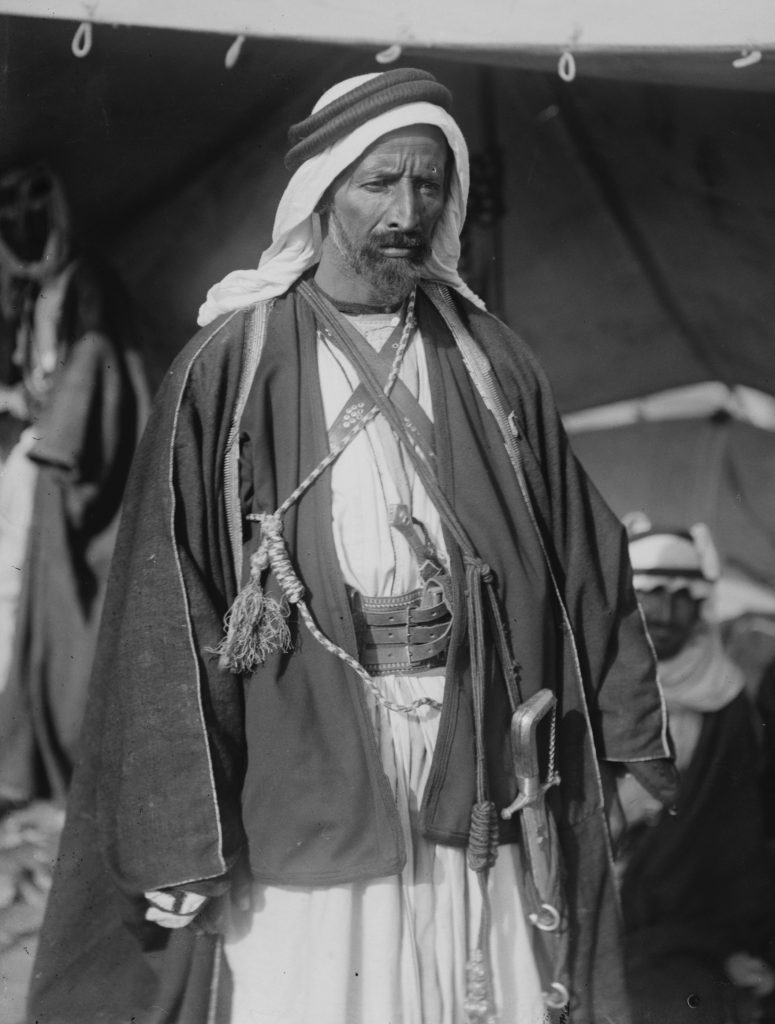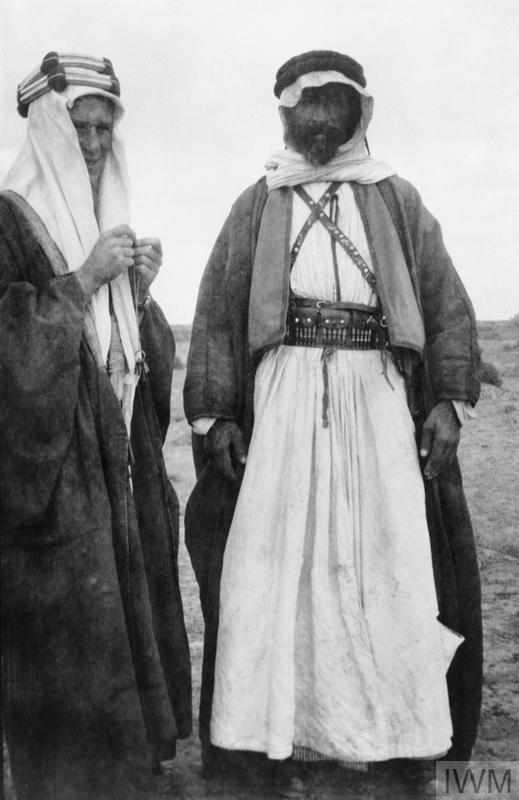
url: https://hdl.loc.gov/loc.pnp/matpc.02315, Public Domain
During World War I, the Middle East became a crucial theatre in the global struggle between empires. Amid this turbulent landscape, one figure stands out as both a fierce tribal warrior and a key Muslim ally to British efforts against the Ottoman Empire: Auda Abu Tayi, leader of the Howeitat tribe.
Who Was Auda Abu Tayi?
Auda Abu Tayi (c. 1874–1924) was a chieftain of the Howeitat tribe, a Bedouin group spread across what is now southern Jordan and northwestern Saudi Arabia. Known for his imposing presence, fearlessness in battle, and deep loyalty to his people, Auda commanded respect from both Arab leaders and British officers. T.E. Lawrence described him as “a splendid man, born to be a leader” [Lawrence, Seven Pillars of Wisdom, 1926].

Joining the Arab Revolt
In 1916, Sharif Hussein of Mecca declared a revolt against Ottoman rule, with British support. Lawrence, a British intelligence officer, was sent to liaise with Arab leaders and foster their cooperation. Auda was initially reluctant to join the revolt, but growing discontent with the Ottoman administration, particularly following personal grievances, shifted his position. After meeting Lawrence and Prince Faisal, Auda joined the revolt in 1917 [Rogan, The Fall of the Ottomans, 2015].
His allegiance brought with him not only hundreds of skilled tribal fighters but also legitimacy among other Bedouin tribes who saw Auda as a powerful and honourable leader.
Military Contributions
Auda’s most celebrated contribution was in the Battle of Aqaba in July 1917. The Arab forces, with Lawrence and Auda at the helm, took the port city by surprise—attacking from the desert, a direction deemed impassable by the Ottomans. This victory was crucial in securing Allied control over the Hejaz Railway and opening a supply line to British forces [Fromkin, A Peace to End All Peace, 1989].
Auda continued to lead desert raids on Ottoman trains and garrisons, often using guerrilla tactics. Lawrence credited Auda’s military leadership as “the pivot of our success” [Lawrence, Seven Pillars of Wisdom, 1926].
A Muslim Fighting for British Aims
Auda fought not out of loyalty to Britain, but from a conviction that the Arab Revolt would lead to independence. He represented a broader Muslim alliance that included countless Arab fighters who supported the British, not out of shared empire, but in hope of liberation from Turkish rule.
His military cooperation directly aided British campaigns in the Middle East, particularly General Allenby’s advance into Palestine. Yet, like many others, Auda’s role in this pivotal campaign has often been underrepresented in mainstream British histories [Ghareeb & Dougherty, Historical Dictionary of Iraq, 2004].
The Broken Promises
While British officials including Sir Henry McMahon made verbal and written promises to Hussein and his sons about Arab independence, they had simultaneously signed the Sykes-Picot Agreement with France in 1916, dividing the Arab provinces of the Ottoman Empire into spheres of influence.
After the war, instead of an independent Arab kingdom, the region was divided under British and French mandates. Though Faisal was made king of a newly formed Iraq, the broader vision of Arab unity and sovereignty was denied. Auda, according to some accounts, was deeply embittered by these betrayals ([Paris, Warrior Nation, 2000]).
Despite having been showered with gifts and honours by the British, including land and gold, Auda died a disappointed man. He had not fought merely for personal gain, but for an Arab future that never came to be.
Legacy
Auda Abu Tayi remains a symbol of courage and resistance. His friendship with Lawrence has often overshadowed his own legacy, especially in Western portrayals such as David Lean’s 1962 film Lawrence of Arabia, where he is fictionalised. But beyond the legend lies a true story: of a Bedouin Muslim leader who took a stand, led from the front, and was ultimately let down by imperial powers who saw the Arab Revolt as a means to an end.
In remembering Auda, we remember not just a formidable warrior, but a man who exemplifies the promises made—and broken—during the Great War.
References
- Lawrence, T.E. (1926). Seven Pillars of Wisdom: A Triumph. Jonathan Cape.
- Rogan, Eugene. (2015). The Fall of the Ottomans: The Great War in the Middle East. Allen Lane.
- Fromkin, David. (1989). A Peace to End All Peace: The Fall of the Ottoman Empire and the Creation of the Modern Middle East. Henry Holt.
- Paris, Michael. (2000). Warrior Nation: Images of War in British Popular Culture, 1850–2000. Reaktion Books.
- Ghareeb, Edmund, & Dougherty, Beth. (2004). Historical Dictionary of Iraq. Scarecrow Press.
- Wilson, Jeremy. (1989). Lawrence of Arabia: The Authorised Biography of T.E. Lawrence. Heinemann.
